
ISJ-Invertebrate Survival Journal
Scope & Guideline
Unveiling the Secrets of Invertebrate Survival
Introduction
Aims and Scopes
- Invertebrate Immunology:
Research on immune responses, mechanisms, and evolution in various invertebrate species, including studies on antimicrobial peptides, hemocytes, and immune system adaptations. - Environmental Stressors:
Investigations into how environmental factors such as pollutants, temperature changes, and microplastics affect the physiology, behavior, and health of invertebrates. - Regeneration and Development:
Studies exploring the regenerative capabilities of invertebrates and the underlying molecular and cellular mechanisms involved in development and regeneration. - Biotechnology and Aquaculture:
Application of invertebrate biology in biotechnology and aquaculture, focusing on health management, disease resistance, and innovative aquaculture practices. - Evolutionary Biology:
Research on the evolutionary dynamics of immune systems, gene families, and the ecological significance of invertebrate adaptations.
Trending and Emerging
- Impact of Climate Change:
An increasing number of studies are focusing on the effects of climate change on invertebrate physiology and ecology, highlighting the urgency of understanding how environmental shifts affect biodiversity. - Microbial Interactions and Health:
Research on the interactions between invertebrates and their microbiomes is emerging, particularly regarding how these relationships influence immune responses and overall health. - Plastic Pollution and Its Effects:
There is a growing body of work examining the impact of plastic pollution on invertebrates, emphasizing the need to understand the ecological consequences of microplastics and nanoplastics. - Functional Genomics:
The use of genomic tools to explore functional aspects of invertebrate biology is on the rise, with studies focusing on gene expression, evolutionary adaptations, and immune system evolution. - Biotechnological Applications:
A trend towards exploring biotechnological applications of invertebrates, including their use in pharmaceuticals and environmental monitoring, is becoming increasingly prominent.
Declining or Waning
- Traditional Toxicology Studies:
There has been a noticeable decrease in studies solely focused on traditional toxicology, as the field increasingly integrates ecological and immunological perspectives. - Basic Morphological Studies:
Research purely centered on morphological characterizations without functional implications has waned, suggesting a shift towards more integrative approaches that combine morphology with molecular and ecological data. - Non-Ecological Laboratory Studies:
Laboratory-based studies that do not consider ecological contexts or implications are becoming less common, reflecting a trend towards more ecologically relevant research.
Similar Journals

Austral Entomology
Empowering Insect Studies for a Sustainable FutureAustral Entomology, published by Wiley, is a leading journal in the field of entomology, specializing in the study of insects within the wider context of agronomy, ecology, and evolutionary biology. With an impact factor that reflects its growing influence and a commendable H-Index, this journal serves a vital role in disseminating cutting-edge research that bridges the gap between basic entomological studies and applied agricultural practices. Since its inception in 2014, Austral Entomology has maintained a strong commitment to open access, fostering a collaborative environment for researchers and practitioners. Recognized within category quartiles Q2 across multiple fields such as Agronomy and Crop Science and Ecology, it ranks impressively among journals in Insect Science, showcasing the significance of its contributions to understanding insect behavior, ecology, and systematics. Given its robust accessibility options, the journal not only enhances the visibility of entomological research but also empowers professionals and students alike to engage with and apply findings in real-world contexts.
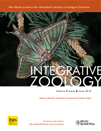
Integrative Zoology
Championing Excellence in Zoological SciencesIntegrative Zoology is a distinguished journal published by WILEY, focusing on advancing the field of zoological sciences through the integration of various biological disciplines. With both ISSN 1749-4877 and E-ISSN 1749-4869 identifiers, this journal features research that fosters a deeper understanding of animal biology, ecology, and conservation strategies. As a testament to its impact, Integrative Zoology is recognized within the Q1 category of Animal Science and Zoology in 2023, ranking an impressive #27 out of 490 journals in its field, placing it in the 94th percentile among peers. Published in the United Kingdom, this journal not only serves as a critical platform for novel research but also engages a global audience, inviting submissions that bridge theoretical and practical aspects of zoology. While not entirely open access, the journal remains committed to disseminating high-quality research that contributes substantially to scientific advancements. Through its continuous publication since 2008, Integrative Zoology aims to inspire researchers, educators, and students alike, making it a cornerstone for anyone passionate about the complexities of animal life.
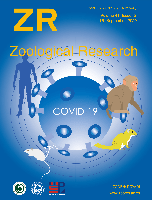
ZOOLOGICAL RESEARCH
Advancing Animal Science Through Open Access ResearchZoological Research, published by Science Press, stands as a premier open-access journal in the fields of animal science, zoology, and ecology. Since its inception in 1980, it has fostered an inclusive platform for innovative research and dialogue within the scientific community, enabling researchers from across the globe to share their findings and insights. The journal's significant impact is underscored by its classification in the Q1 quartile across multiple categories, including Animal Science and Zoology, Ecology, and Nature Conservation for 2023, as well as its impressive rankings within Scopus, placing it in the top tier of its respective fields. Situated in Beijing, China, Zoological Research not only contributes to advancing knowledge but also emphasizes the critical importance of conservation practices in today’s rapidly changing ecosystems. With its commitment to open access, researchers, educators, and students alike benefit from immediate, unrestricted access to vital scientific information, making it an essential resource for anyone involved in the biological sciences.
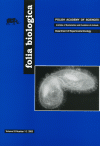
FOLIA BIOLOGICA-KRAKOW
Exploring the frontiers of biochemistry and genetics.FOLIA BIOLOGICA-KRAKOW, published by the renowned Polish Academy of Sciences, Institute of Systematics and Evolution of Animals, serves as a pivotal platform for advancing research in the fields of Biochemistry, Genetics, and Molecular Biology. Since its inception in 1953, this journal has consistently contributed to the academic dialogue, focusing on a diverse range of topics, including evolutionary biology, molecular genetics, and ecological biochemistry. Although currently classified in Q4 quartiles according to the 2023 categorizations in both Biochemistry, Genetics and Molecular Biology (miscellaneous) and Medicine (miscellaneous), its dedicated efforts to disseminate critical findings and foster scholarly exchange ensure its relevance and growth in the scientific community. FOLIA BIOLOGICA-KRAKOW is not Open Access, but researchers can access its publications through institutional subscriptions or library services, making it a valuable resource for scientists seeking to enrich their understanding of biological processes. With its commitment to excellence and innovation in biological research, this journal remains an essential reference for researchers, professionals, and students alike, contributing significantly to the evolution of contemporary biological sciences.

ZHURNAL OBSHCHEI BIOLOGII
Unveiling the Mysteries of Life Since 1945ZHURNAL OBSHCHEI BIOLOGII, published by MEZHDUNARODNAYA KNIGA in the Russian Federation, is a venerable journal with a rich history originating in 1945. Renowned for its contributions to the fields of Ecology, Evolution, Behavior, and Systematics, as well as Medicine (miscellaneous), this journal provides a platform for researchers and professionals to disseminate significant findings within these domains. Although currently not classified as an open access publication, ZHURNAL OBSHCHEI BIOLOGII holds a Q4 quartile designation in its respective categories, reflecting its unique positioning within the global research landscape. While its coverage in Scopus is limited, the journal remains an important resource for academics interested in the evolution of biological sciences, especially within the context of Russian research traditions. By fostering scholarly communication and collaboration, ZHURNAL OBSHCHEI BIOLOGII continues to play a critical role in advancing knowledge in the biological sciences.
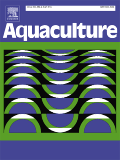
AQUACULTURE
Advancing aquatic science for a sustainable future.AQUACULTURE is a premier academic journal dedicated to the field of aquatic science, published by Elsevier. With a robust Impact Factor, the journal is renowned for its significant contributions to aquatic biology and the sustainable development of aquaculture practices. Since its inception in 1972, AQUACULTURE has established itself as an essential resource for researchers and professionals in the industry, regularly ranked in the Q1 category of aquatic science journals and positioned in the 14th percentile of its field according to Scopus rankings. Covering a wide array of topics including fish biology, aquaculture technology, sustainable practices, and environmental impacts, AQUACULTURE aims to disseminate innovative research findings that drive the industry forward. The journal, accessible to a global audience from its base in the Netherlands, continues to foster collaboration, discussion, and application of research to both academic and practical realms within aquaculture. Researchers and students alike will find valuable insights and current trends in this highly respected publication.

RUSSIAN JOURNAL OF THERIOLOGY
Bridging Disciplines in Zoology and Plant ScienceRUSSIAN JOURNAL OF THERIOLOGY is a prominent academic journal published by KMK SCIENTIFIC PRESS LTD in collaboration with the esteemed Moscow State University. As a dedicated platform for researchers in the fields of Animal Science and Zoology, Ecology, Evolution, Behavior and Systematics, and Plant Science, this journal strives to advance our understanding of terrestrial ecosystems and their inhabitants. Although it currently holds a Q4 ranking and ranks within the lower percentiles of its respective categories, the journal's consistent publishing output since 2011 showcases a commitment to facilitating scientific discourse and collaboration. Addressed to a diverse audience of researchers, professionals, and students, RUSSIAN JOURNAL OF THERIOLOGY serves as an essential resource for disseminating valuable insights and fostering future advancements in the biological sciences.
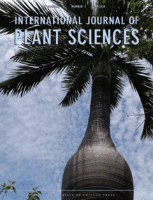
INTERNATIONAL JOURNAL OF PLANT SCIENCES
Cultivating excellence in plant research and publication.The INTERNATIONAL JOURNAL OF PLANT SCIENCES, published by UNIV CHICAGO PRESS, is a leading journal dedicated to advancing knowledge in the fields of plant sciences and ecology. With an ISSN of 1058-5893 and an E-ISSN of 1537-5315, this journal has been a prominent platform for groundbreaking research since its establishment, featuring works from 1983 to present. It holds an impressive Q2 ranking in both Ecology, Evolution, Behavior and Systematics and Plant Science, reflecting its reputable standing within the academic community. The journal is well-regarded for its rigorous peer-review process and commitment to high-quality publication standards, making it a favored choice for researchers, students, and professionals eager to engage with the latest findings and innovative methodologies in plant research. While it does not currently operate under an Open Access model, the journal provides ample access options for institutions and individuals keen to explore its curated content. By presenting diverse studies that blend theoretical and practical insights, the INTERNATIONAL JOURNAL OF PLANT SCIENCES plays a critical role in fostering interdisciplinary dialogue and advancing the frontiers of plant science research.
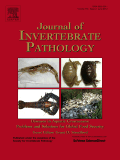
JOURNAL OF INVERTEBRATE PATHOLOGY
Exploring the Complexities of Invertebrate PathologyJournal of Invertebrate Pathology, published by Academic Press Inc. Elsevier Science, stands as a leading platform for the dissemination of cutting-edge research in the field of invertebrate pathology. With an impressive impact factor reflecting its prominence—ranking Q1 in the category of Ecology, Evolution, Behavior and Systematics and placing in the 84th percentile within its Scopus classification—you can trust that the contributions found within these pages are of the highest caliber. Established in 1965, this journal continues to attract a global audience of scholars, researchers, and professionals dedicated to exploring the intricate interplay between invertebrates and pathogens. While it operates under a traditional subscription model, the journal remains committed to advancing knowledge through rigorous peer-reviewed articles, comprehensive reviews, and enlightening case studies. With a broad convergence of topics from ecology to applied biological sciences, the Journal of Invertebrate Pathology is integral for anyone seeking to deepen their understanding or contribute to this vital area of study.
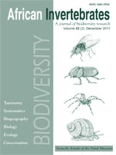
AFRICAN INVERTEBRATES
Exploring Africa's Hidden BiodiversityAFRICAN INVERTEBRATES is a distinguished open-access academic journal published by the COUNCIL NATAL MUSEUM, specializing in the study of invertebrate biology within the vibrant ecosystems of Africa. Operating since 2006, this journal has established itself as a vital resource in the fields of Animal Science, Ecology, Evolution, Behavior, Insect Science, and Paleontology, earning a strong Q2 ranking in these categories as of 2023. With its ISSN 1681-5556 and E-ISSN 2305-2562, the journal provides unrestricted access to cutting-edge research, fostering collaboration among global researchers and professionals. AFRICAN INVERTEBRATES serves not only as a platform for high-quality scholarly articles but also aims to enhance the understanding of Africa's unique invertebrate fauna and the ecological challenges they face. With a commitment to innovation and excellence, the journal is pivotal for those looking to contribute to the discourse surrounding African biodiversity and conservation strategies.